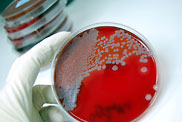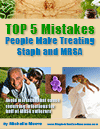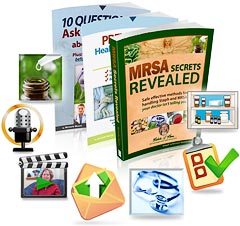MRSA Carrier: Questions and Answers
What is a carrier? Can I ever get rid of MRSA? Will I always be a carrier of MRSA?

Staph and MRSA bacteria commonly live in the nose of carriers.
MRSA is a growing problem across the world, often causing painful skin boils and abscesses, but also internal infections like pneumonia. Everyone is exposed to these contagious bacteria more often than they realize, but yet not everyone who is exposed gets infected.
For some, MRSA simply lives inside their nose and on their skin and it doesn’t cause any symptoms or infection. These people are called “MRSA carriers“. Carriers may never get infected. However, carriers can spread MRSA to other people who may become infected.
Continue reading for commonly asked questions, plus facts about this disease even most doctors don’t know.
MRSA and Staph carriers: Symptoms, infection transfer, testing and more
Some people are a Staph infection carrier. MRSA is an antibiotic resistant type of Staph bacteria. Staph is typically easier to treat as it causes a less dangerous infection.

Your doctor may have said you are “colonized” with the bacteria. MRSA colonization is the same as being a carrier. People who harbor MRSA can spread or transmit the bacteria to others. It’s possible for them to spread it to someone else who then becomes infected.
Because some MRSA infections can be very dangerous, and some people are at greater risk (elderly, young, and immune compromised) a lot of emphasis is placed upon decolonization procedures, or ways to remove the bacteria from your body. Read on below for prevention and treatment methods.
Medical professionals often downplay the risks of being a carrier or being around carriers. However, carriers of MRSA can spread the disease to others. And MRSA carriers have been documented to spread the bacteria into the air. A Leeds University study3 highlighted the potential risk of catching MRSA in a hospital. This 2001 study highlighted that people who were either infected or who were simply colonized can spread the bacteria into the air, creating a risk for others around them.

Only a test can tell if you carry the bacteria or not.
This is because carriers can have the bacteria living in other parts of their bodies and still test negative at their noses. Some doctors believe that the back of the throat is a more accurate place to test. The bacteria prefer places that are warm and moist, including the nose, throat, armpits and the groin area. In fact, some doctors will also test the throat and groin area in addition to the nose.
Signs of infection can include an infection that looks like a bug or spider bite, skin bumps, pimples, boils and abscesses. Internal infections are more commonly seen with hospital visits and can be pneumonia, septicemia or catheter infections. Click here for symptoms to watch for.
MRSA bacteria are commonly transferred from surfaces and objects that are contaminated with the bacteria (like phones, door knobs, toys, etc) to your skin. You can also become a carrier after having an infection. It can also pass through the air on dust and other particulates.
MRSA decolonization and treatments for carriers

See our PRIVACY POLICY
However, MRSA and Staph can be very difficult to get rid of. A powerful factor is that these bacteria can create biofilm colonies and L-form “stealth bacteria” to hide and protect themselves inside your body. Many antibiotics do not work against these stealth bacteria and that’s where non-antibiotic approaches come in. Many people have found taking maintenance levels of natural antimicrobial agents like oregano essential oils and olive leaf herbal supplements to be very helpful. Products that break down biofilm layers in the body can be beneficial and can also help your antibiotics to work better, such as Manuka honey. Strengthening your immune system is also an important factor.
Antibiotics have the side effect of killing the good bacteria that help to protect and support your health. Because of this and other side effects, Michelle favors methods that work with the body and minimize antibiotic side effects. She has seen complementary treatments, such as swabbing the nose using essential oils, and supporting the immune system help people clear MRSA bacteria from their nose. A simple solution may also be provided by Vitamin D. A study in the Scandinavian Journal of Infectious Disease5 showed an increased risk of MRSA nasal colonization with low vitamin D levels. Vitamin D works in many ways to support your immunity, one of which is helping the skin create antibacterial agents. Most people are very deficient in this important immune supporting vitamin.
A better goal is to restore balance to the protective bacteria inside your gut and on your skin and restore the health of your body’s natural defenses. Because of the superbug bacteria present everywhere today, it’s important to make your body more resistant to these bacteria. Resisting infection can be much easier if your immune system is strong and your body is in balance.
A holistic approach to protecting against infections

Working with your body and your immune system can make it naturally more resistant to infections
The best way to guard against infection is to use a multi-front approach. While good hand and body hygiene, using treatments that work, and cleaning your home are all important, those who make their body naturally resistant to infections see the best results.
If you are a carrier or if you have an active infection, learn how to use treatments that support your body without tearing it down. If you’ve been infected in the past, then boosting and maintaining your natural resistance is one of the most effective things you can do. You can learn about the most important steps to stop MRSA here.

- How contagious is MRSA and Staph? And how does MRSA spread?
- More about Chlorhexidine protocols and dangers
- Airborne Staph and MRSA: MRSA carriers can spread MRSA through the air
- Important MRSA Myths: Antibiotics, cures, doctors and more
Protect yourself and your familyMRSA and Staph are serious and potentially life-threatening infections. Antibiotics and conventional medicine often fail against these superbugs. Fortunately, there are powerful natural and alternative remedies for handling these infections.
The MRSA Secrets Revealed Program contains Michelle’s 3-Step Infection-Free Method™, a complete how-to guide to naturally stop these infections. It includes the strongest remedies for skin, internal, nose and other types of infection. The program also includes ways you can protect yourself and your family in hospitals and in the community.
Get started now by clicking the button below.
References:
1. Clin Infect Dis. 2008 Jul 15;47(2):176-81. Risk of infection and death due to methicillin-resistant Staphylococcus aureus in long-term carriers. Datta R, Huang SS. https://www.ncbi.nlm.nih.gov/pubmed/18532892
2. PLoS One. 2013;8(1):e53674. Epub 2013 Jan 10. MRSA nasal carriage patterns and the subsequent risk of conversion between patterns, infection, and death. Gupta K, Martinello RA, Young M, Strymish J, Cho K, Lawler E. https://www.ncbi.nlm.nih.gov/pubmed/23326483
3. Significance of Airborne Transmission of Methicillin-Resistant Staphylococcus aureus in an Otolaryngology–Head and Neck Surgery Unit; Teruo Shiomori, MD, PhD; Hiroshi Miyamoto, MD, PhD; Kazumi Makishima, MD, PhD; Arch Otolaryngol Head Neck Surg. 2001;127(6):644-648. https://archotol.jamanetwork.com/article.aspx?articleid=482358
4. Infect Control Hosp Epidemiol. 2008 Jun;29(6):510-6. Highly effective regimen for decolonization of methicillin-resistant Staphylococcus aureus carriers. Buehlmann M, Frei R, Fenner L, Dangel M, Fluckiger U, Widmer AF. https://www.ncbi.nlm.nih.gov/pubmed/18510460
5. Scand J Infect Dis. 2010 Jul;42(6-7):455-60. Vitamin D and methicillin-resistant Staphylococcus aureus nasal carriage. Matheson EM, Mainous AG 3rd, Hueston WJ, Diaz VA, Everett CJ. https://www.ncbi.nlm.nih.gov/pubmed/20210515





